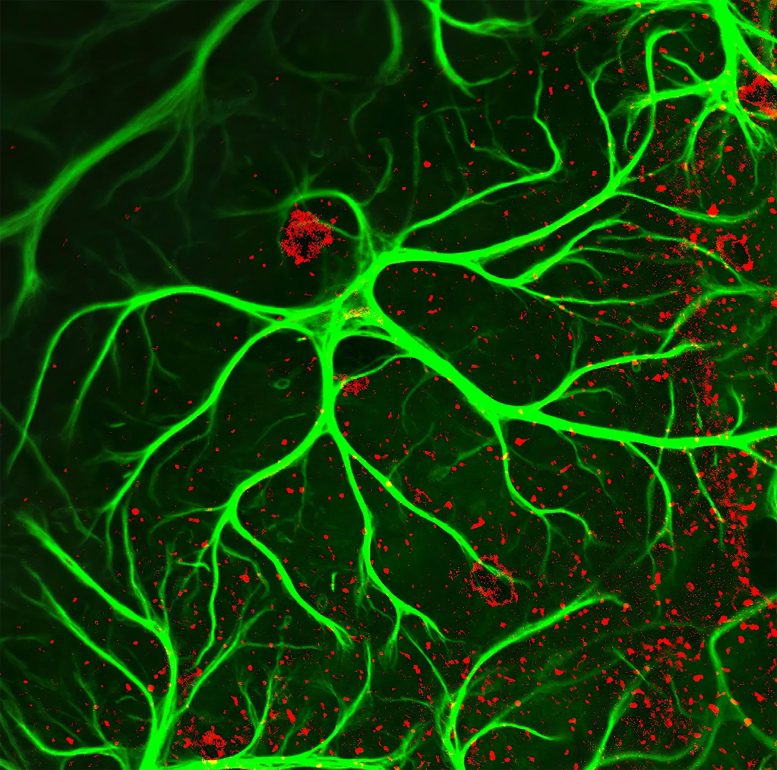
Researchers have revealed how octopamine, a primary neurotransmitter in invertebrates and present in small amounts in mammals, interacts with cells in the mammalian brain to prevent cell death. The scientists found that when octopamine is introduced at certain levels in astrocyte cultures from mice’s cerebral cortex, it triggers lactate production, thus promoting cell survival. These findings are crucial because they shed light on the functioning of octopamine in the mammalian brain, likened to an SOS signal that prompts astrocytes to produce energy to prevent cell death due to ATP shortage. The discovery could potentially contribute to developing treatments for conditions like Alzheimer’s disease, Parkinson’s, and bipolar disorder, all associated with imbalanced octopamine levels. Credit: Northwestern University
Scientists at Northwestern Medicine have discovered that octopamine, a neurotransmitter present in trace amounts in mammals, interacts with brain cells to prevent cell death. The study found that introducing octopamine into astrocyte cultures triggers lactate production, promoting cell survival. This understanding of octopamine’s role could inform future therapies for neurodegenerative diseases and psychiatric disorders linked to dysregulated octopamine levels, such as Alzheimer’s, Parkinson’s, and bipolar disorder.
Northwestern Medicine scientists have discovered how octopamine, the major “fight-or-flight” neurotransmitter in invertebrates, communicates with other cells in mammalian brains to prevent cell death, according to a study published in the Proceedings of the National Academy of Sciences.
Although octopamine is still found in the mammalian brain in trace amounts, its function has been replaced by epinephrine. Long thought to have been an evolutionary leftover in mammals, the role of octopamine in the human brain has not previously been well understood.
In the current study, investigators first set out to understand how astrocytes, which make up the majority of cells in the human central nervous system, contribute to brain dysfunction in neurodegenerative diseases. In astrocyte cultures from the cerebral cortex of mice, scientists found that introducing octopamine at certain levels prompted the production of lactate in the astrocytes, promoting cell survival.
“Our findings are significant because we found a way in which this trace amine, octopamine, operates in the mammalian brain,” said Gabriela Caraveo Piso, PhD, assistant professor in the Ken and Ruth Davee Department of Neurology Division of Movement Disorders. “Think of it like an SOS signal; Neurons that are stressed send out this signal to astrocytes to send them energy, to send lactate. At the right level, octopamine allows astrocytes to read this distress signal and start making energy which will protect the cells from death by lack of ATP. If there’s too much octopamine, it’s sort of like smoke getting in the way of the SOS. It can’t be read by the astrocytes.”
The findings could help inform future therapies for Alzheimer’s disease, Parkinson’s, and bipolar disorder, all of which have been associated with dysregulated levels of octopamine in the brain, Caraveo Piso said.
“Lactate was thought of as a waste product for a long time. But it turns out that it is not, it is a very important fuel that the neurons need to convert to higher forms of energy,” Caraveo Piso said. “We think this is important because this can impact other diseases where octopamine levels are altered, including Alzheimer’s disease and psychiatric disorders.”
Moving forward, Piso and her collaborators hope to better understand how octopamine operates in healthy brains.
“What we want to know now is: Does this only happen under disease-like conditions? Or does octopamine play a role under physiological conditions such as learning and memory, where neurons also experience high energic demands?” Caraveo Piso said. “Given that octopamine can harness lactate metabolism in astrocytes, we are also interested in understanding the role of lactate metabolism in the brain in this context of memory and learning and aging.”
Reference: “Octopamine metabolically reprograms astrocytes to confer neuroprotection against α-synuclein” by Andrew Shum, Sofia Zaichick, Gregory S. McElroy, Karis D’Alessandro, Milad J. Alasady, Michaela Novakovic, Wesley Peng, Ekaterina A. Grebenik, Daayun Chung, Margaret E. Flanagan, Roger Smith, Alejandro Morales, Laetitia Stumpf, Kaitlyn McGrath, Dimitri Krainc, Marc L. Mendillo, Murali Prakriya, Navdeep S. Chandel and Gabriela Caraveo, 17 April 2023, Proceedings of the National Academy of Sciences.
DOI: 10.1073/pnas.2217396120
This study was supported by the Northwestern University Clinical and Translational Sciences Institute, the Parkinson’s Foundation, and the National Institute of Neurological Disorders and Stroke Grant R01 NS117750.

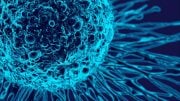
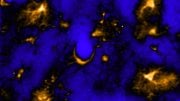
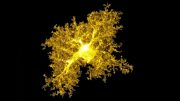

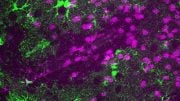
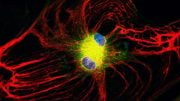
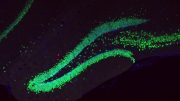

Be the first to comment on "Octopamine: The Brain’s SOS Signal Plays Crucial Role in Neurodegeneration"